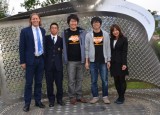On November 4, 2013, Nagasaki students Kenichi EJIMA (Ken) and Haruka MAEKAWA were welcomed up onto the stage of the final plenary of the 5th Nagasaki Global Citizens Assembly for the Elimination of Nuclear Weapons to make a special presentation from Swiss Youth Bans the Bomb to Nagasaki Mayor Tomihisa Taue. Just 5 days earlier, Ken and Haruka were honorary guests in Heiden, Switzerland at a ceremony in front of the Museum of Henri Dunant – founder of the International Committee of the Red Cross (ICRC). They were part of a series of events that are bringing Swiss and Japanese youth and anti-nuclear campaigners together in a new drive to achieve a nuclear weapons-free world.
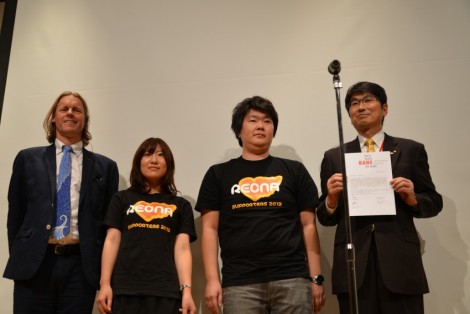
Kenichi EJIMA, Haruka MAEKAWA and Alyn Ware present the Heiden letter to Nagasaki Mayor Tomihisa Taue
Nagasaki is one of the two cites to have been bombed with nuclear weapons. It has thus been at the forefront of international efforts to highlight the destruction caused by nuclear weapons and the imperative to eliminate nuclear weapons. Nagasaki Mayor Taue is head of a Japanese network of 287 cities that have declared themselves to be nuclear-weapons-free in opposition to Japanese government policies to be ‘protected’ by US nuclear weapons under an extended nuclear deterrence military alliance. He is also Vice-President of Mayors for Peace, a global alliance of over 5000 cities calling for negotiations on a nuclear weapons convention – a global treaty to prohibit and eliminate nuclear weapons.
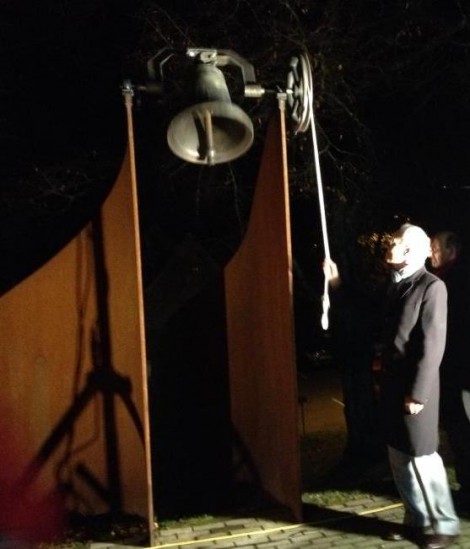
Nagasaki Peace Bell in Heiden being rung to open the Swiss Youth Bans the Bomb conference
‘Nagasaki ‘hibakusha’ - survivors of the nuclear bombing - have travelled tirelessly telling their horror stories of the nuclear bombing to demonstrate the inhumanity and illegality of these weapons. Tomihisa Taue’s immediate predecessor as Mayor of Nagasaki, Icoh Itoh, was himself a hibakusha who played a vital role testifying in the International Court of Justice case that resulted in a conclusion that ‘the destructive effects of nuclear weapons cannot be contained in time or space’ and that ‘the threat or use of nuclear weapons would generally be illegal.'
With the passage of time, surviving hibakusha number very few. So now Nagasaki youth are picking up the baton, learning the stories from their grandparents' generation, and reaching out to youth globally to ensure that this generation succeeds in banning the bomb. Their efforts have been buttressed by national Red Cross societies which have become more active since the ICRC adopted a resolution in November 2011 supporting the ICJ conclusion that the use of nuclear weapons is scarcely reconcilable with international humanitarian law, and calling for global abolition.
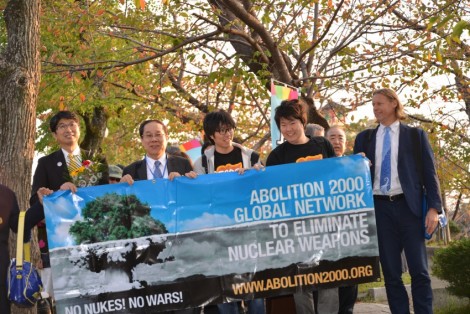
Nagasaki Mayor Taue, Peoples Assembly Chair MasaoTomonaga, RECNA students and Alyn Ware lead the Nagasaki Peace Walk
Thus the significance of Heiden as the place for the Swiss Youth Bans the Bomb conference – and to include participation of Nagasaki youth. In fact, Haruka and Ken had the honour in Heiden of opening the conference by ringing the Peace Bell which was donated by the City of Nagasaki to Heiden a few years previously.
Ken and Haruka, students at the University of Nagasaki and members of the Research Centre for Nuclear Abolition (RECNA), were brought to Switzerland with financial support from the Henri Dunant Museum Society and the help of the Basel Peace Office which works with RECNA on a number of projects. These include the Nuclear Abolition Forum, PNND (engaging legislators) and the proposal for a North East Asian Nuclear Weapon Free Zone, possibly the best chance to denuclearise North Korea and lower the role of nuclear weapons in Japanese and South Korean policies (See Nuclear sabre-rattling in North East Asia: Can Godzilla be tamed?)
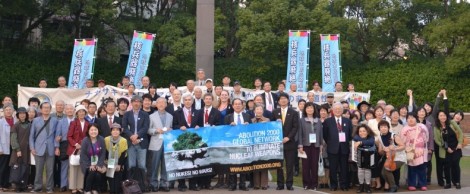
Nagasaki Assembly participants at the nuclear bomb hypocentre in Nagasaki
An emerging focus for the two centres (Basel and Nagasaki) is how to empower youth who may know about global problems such as the nuclear weapons – but feel that they are powerless to change the vested interests in the status quo. At the Swiss Youth Bans the Bomb conference in Heiden, for example, Ken and Haruka reported on a recent RECNA survey which found that although 75% of Nagasaki youth knew about the catastrophic consequences of nuclear weapons, very few were active in the anti-nuclear movement as 94% of them believed that it was impossible to abolish nuclear weapons – and thus action was useless.
In light of this research, the Basel Peace Office offered workshops for youth at the Heiden conference and at Nagasaki University emphasising not the horror nuclear weapons – but the processes for resolving conflicts and effecting change. Prior to the workshop in Nagasaki only 5% of the students indicated that they believed nuclear abolition to be possible. After the workshop over 60% indicated that they had changed their mind – nuclear abolition was possible and they were interested now in becoming involved.
Before I listen to your talk I didn’t think that we can clear all nuclear weapons in the world. But now I believe that we can! I’m just ordinary people. I am not official. However, in my opinion if we cooperate we can achieve the top of the ‘nuclear-free mountain’.Student in Nagasaki University after the Basel Peace Office workshop
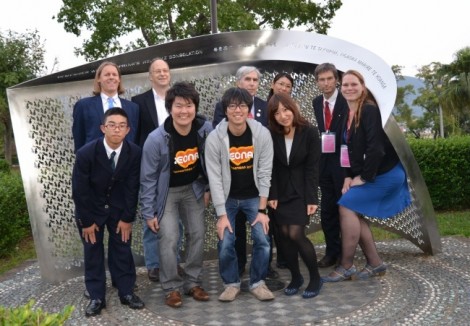
RECNA students and Nagasaki Assembly participants at 'The Cloak of Peace' sculpture donated by New Zealand to the Nagasaki Peace Park
Participants of the Heiden and Nagasaki conferences considered a range of actions that can be taken by youth and other anti-nuclear activists to help achieve a nuclear weapon free world – including informing other youth (through events and social media), establishing nuclear-weapon-free zones (local, national and regional), choosing to hold accounts only with banks that do not invest in nuclear weapons, encouraging their parliamentarians to take action (including through joining Parliamentarians for Nuclear Non-proliferation and Disarament), and calling on governments to support negotiations to abolish nuclear weapons globally.
I thought the nuclear weapon free world is impossible. I thought that there are too many people in the world who support nuclear weapons – so I thought that we would always have the fear of nuclear weapons. But I learned today that there is the way to oppose illegal nuclear weapons. I now feel the possibility of achieving the nuclear weapon free world.Student in Nagasaki University after the Basel Peace Office workshop
For further information see
* Nagasaki Appeal, adopted by the 5th Nagasaki Global Citizens’ Assembly for the Elimination of Nuclear Weapons;
* Swiss Youth Bans the Bomb resolution (in German), adopted at the Swiss Youth Bans the Bomb conference
Take action: Endorse the Nagasaki Peace Declaration
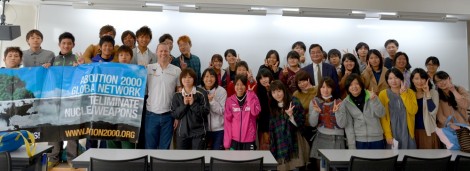
Alyn Ware (Basel Peace Office) with University of Nagasaki class after the session on A nuclear-weapon free world- Is it possible?
